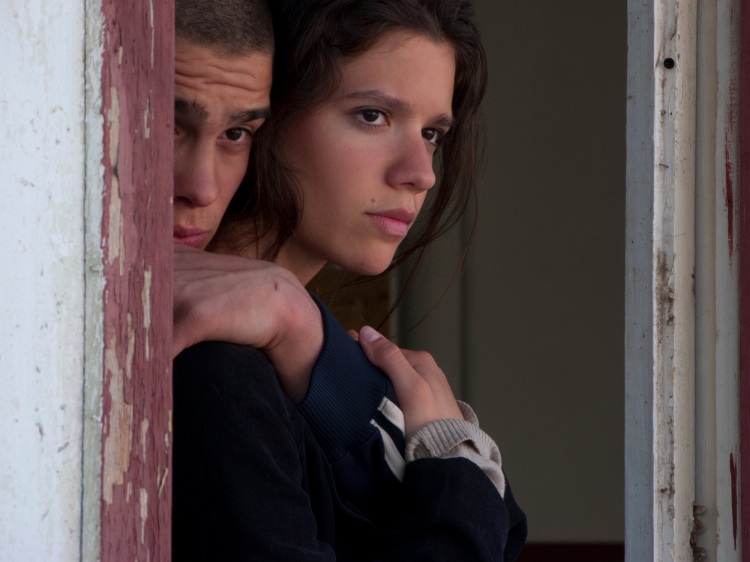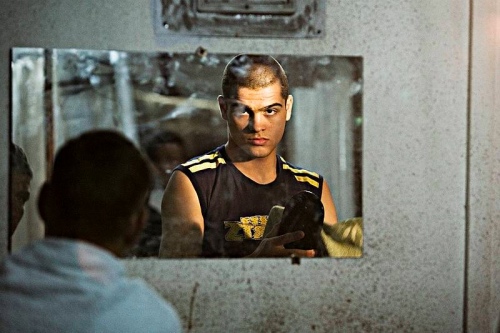
Eighteen-year-old Silviu is serving out the last few days of his four year prison sentence. Called away from his manual labour, Silviu finds an unexpected visitor waiting for him: his younger brother, bringing news that their mother has returned from Italy. His mother’s return catches Silviu off guard; it obviously wasn’t expected, and it obviously isn’t wanted. It’s clear that Silviu’s bond with his brother runs deep, more fatherly than fraternal. Silviu’s need to protect his brother manifests itself in anger when he hears that his mother wants to take his brother away. Silviu, we learn, will do anything to prevent his mother from ruining his brother’s life in that way that she ruined his. But the mother wants to whisk the brother away before Silviu’s release, meaning that if he’s going to take action, he’s going to have to do it from inside…
As the above might imply, Florin Şerban’s masterful If I Want to Whistle, I Whistle plays out, in many ways, as more of a family drama than a prison drama, despite its juvenile detention centre setting. Debutant George Piştereanu’s mesmerising performance as Silviu grounds the film and provides its emotional core. He is simmering and intense, with a dangerous violence beneath his surface, yet he is also passionate and likeable. His affection for his brother wins us over, and despite the barbarity of some of his actions he manages to retain our sympathy. We want him to succeed, to save his brother, and if his actions spiral out of control and break our heart, it’s as much the prospect that he won’t get his release – the second chance he deserves – as the actions themselves which upset us. Silviu, one can’t help but feel, is the victim of circumstance, and if his family life had taken a different track he could have been an educated romantic. Indeed, the unexpected direction taken by the film’s ‘romantic’ subplot is one of the film’s most engrossing aspects, and provides a large insight into Silviu’s damaged and complicated personality.
 Inspired by a play of the same name by Andreea Vălean, the screenplay for If I Want to Whistle, I Whistle (written by Şerban and Cătălin Mitulescu), was developed over an eighteen month period which included workshops with young offenders from Romanian state penitentiaries. Substantial changes to the original text were made, including the invention of the mother and the brother, who play such a key role here. Şerban’s nonjudgmental attitude towards the offenders – both in real life and onscreen – provide the film with its heart, and his wish to understand them (and their mistakes) imbue the film with its multifaceted depth. As Şerban’s debut feature, If I Want to Whistle, I Whistle surely heralds the arrival of a new major player on the world cinema scene. The film was nominated for the Golden Bear at the 60th Berlin International Film Festival, where it also won the Jury Grand Prix Silver Bear and the Alfred Bauer Award. One can only hope that these awards are the first of many.
Inspired by a play of the same name by Andreea Vălean, the screenplay for If I Want to Whistle, I Whistle (written by Şerban and Cătălin Mitulescu), was developed over an eighteen month period which included workshops with young offenders from Romanian state penitentiaries. Substantial changes to the original text were made, including the invention of the mother and the brother, who play such a key role here. Şerban’s nonjudgmental attitude towards the offenders – both in real life and onscreen – provide the film with its heart, and his wish to understand them (and their mistakes) imbue the film with its multifaceted depth. As Şerban’s debut feature, If I Want to Whistle, I Whistle surely heralds the arrival of a new major player on the world cinema scene. The film was nominated for the Golden Bear at the 60th Berlin International Film Festival, where it also won the Jury Grand Prix Silver Bear and the Alfred Bauer Award. One can only hope that these awards are the first of many.


